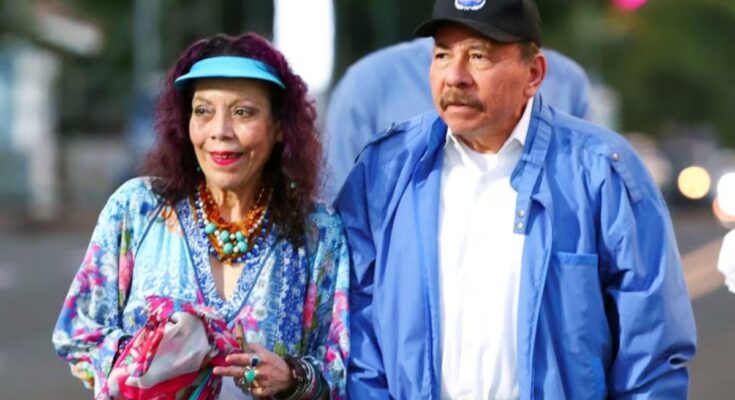Daniel Ortega and Rosario Murillo have expanded the censorship that their co-presidential regime imposes on the Internet. Thus, the last remaining bastion of freedom of expression and press in Nicaragua is also surrounded by dissident voices. With the entry into force of the new General Law of Convergent Telecommunications, the two-headed Administration not only imposes a technical change in the organization of networks, antennas or the Internet in the Central American country, but also consolidates a scheme of total censorship in the last existing space to express dissent.
According to opposition groups, who have dubbed it the “gag law”, one of the most alarming aspects is the total power given to the Nicaraguan Institute of Telecommunications and Postal Services (TELCOR). At the head of this organization is Nahima Díaz Flores, daughter of the head of the National Police, Commissioner Francisco Díaz, and sister-in-law of one of the sons of the presidential couple. According to regulation number 1223, among many broad prerogatives, the regulatory body can request statistical and georeferenced data from audiovisual operators and suppliers.
The suppliers must be aligned with the Police – the main repressive arm of the co-presidential couple – and the intelligence services, which consolidate a digital surveillance system capable of reconstructing who communicates with whom, from where, how often and at what times. Alexa Zamora, author of the report The Convergent Telecommunications Law and its Impact on the Exercise of Human Rights, is one of the most cited experts in the Nicaraguan media these days. It warns that “the Convergent Telecommunications Law, together with cybercrime law reforms and accession to the United Nations Convention on Cybercrime, may establish a legal framework that facilitates the restriction of freedom of expression and other digital rights in Nicaragua.”
“Although the regulation of telecommunications and the fight against cybercrime are legitimate objectives, it is essential that these laws are implemented with respect for human rights and fundamental freedoms, which in a context like that of Nicaragua is clearly not respected,” warns the expert.
Surveillance network
This new regulation, approved last week, adds to the other punitive laws promoted by the Sandinista regime after 2018, the year of social protests, which served to silence any critical voice, especially that of journalism which – despite persecution and systematic exile – still resists and uses the Internet and social networks as its main tool.
These laws are the Cybercrime Law, with which the presidential couple decides what is fake news and can impose up to eight years in prison. And the Foreign Agents Law, which criminalizes international cooperation and “treason,” which includes loss of nationality and confiscation of assets. Before the entry of Convergent Telecommunications, the Sandinista regime had already begun to besiege the network with blocking of independent media’s .com.ni domains, pressure on cable television companies to remove critical channels from the network, and threats from TELCOR against local radio and television stations, not to mention the political imprisonment and harassment that led to the exile of more than 250 journalists.
A law that is passed off as modern
Judging by what the ruling party says, law 1223 arises as a need to modernize the entire telecommunications framework: fixed and mobile telephony, internet, cable television, streaming services, use of the radio spectrum, satellites and even some digital platforms. However, in Articles 1 and 3, the law hides the sword: it not only regulates public telecommunications services, but also audiovisual communications services, the use of radio spectrum, numbering resources, satellite signals landing in the country, and any person or company importing telecommunications equipment.
TELCOR, the same institution that finances and organizes the troll farms linked to the Government and which were closed by Meta, is the one that governs and decides everything. “Put simply: if until now the regime controlled above all all content – closing the media, blocking websites, intimidating journalists – with law 1223 it aspires to also control the tubes where information travels. Not only what is said, but where it is said, with what quality, who facilitates it, under what conditions and in front of who is responsible”, warns journalist Néstor Arce, director of the newspaper. Divergent and one of the greatest experts on technological issues.
“Where the law most clearly shows its macabre control objective is in the block dedicated to information, supervision and inspection. Article 110 obliges operators of public telecommunications services and providers of audiovisual communications services to provide ‘all requested information’, including statistical and georeferenced information, periodically or on the basis of specific requests from Telcor,” explains Arce.
Experts point out that the impact of surveillance will be notable in aspects such as identifying networks of people, without reading a single message, since Telcor, by requesting all of a user’s connections and cross-referencing them with the surveillance and intelligence equipment recently denounced by the United Nations Panel of Experts, can reconstruct a map of someone’s relationships or a geographical map of the movements and activities of opponents or those it considers suspicious.
Likewise, they will be able to track the territorial meetings of opponents and map the consumption of independent information. “Now let’s suppose a medium in exile who broadcasts a news program on YouTube and who, every day at eight in the afternoon, receives a peak of visits from Nicaragua. From the point of view of the network, it is a set of devices that connect, simultaneously, to the same domain or server”, exemplifies Arce in his article. “But if Telcor has access to aggregate statistical data, it can know in which areas of the country the audience of that medium is concentrated. If it cross-references this information with socioeconomic data or with documents from the Supreme Electoral Council, it can profile which type of population is consuming critical content. In a more invasive scenario, it could also prepare lists of phone numbers that repeatedly access “inconvenient” domains and then selectively block those sites in certain regions or direct specific propaganda campaigns against that audience.”
With the entry into force of this convergent telecommunications law, the paranoia of Nicaraguans triples and forces them not only to remain silent, but to take the use of tools such as VPNs and other types of digital precautions very seriously. This is talked about, secretly, on social networks and closed messaging groups.



